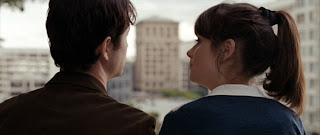Based on a Novel by Khaled Hosseini
Writer: David Benioff
Director: Marc Forster
Director of Photography: Roberto Schaefer
Composer: Alberto Iglesias
Editor: Matt Chesse
Lead Actor: Khalid Abdalla
Year: 2007

The story started as a novel written by an Afghan author named Khaled Hosseini. Soon some producers got involved, and then Marc Forster, the director. Everyone seemed to think the book would make a good film.
The film starts with some cool opening titles, and then cuts to the grown-up main character in San Francisco. He gets a call from an old friend telling him to come back to his land because “there’s a way to be good again”. Hm, what happened? The film goes on to tell.
We find that that the main character betrays his closest friend, Hassan. This leaves him with years of guilt. The boys get separated by war and then a tragedy befalls Hassan. This leaves him with even more shame and regret. Later in his life, he tries “to be good again” and redeem himself. The film indeed has a good ending, a happy ending.
 So what’s with the title? Besides it being the name of the movie, it was the first element of Khaled’s book. A number of sequences are built around the kites. They are also apparently a sort of metaphor of being free and above and the reproaches of life. Besides that, the images with the kites are beautiful. There’s a certain life in them that gives the film some real spice and pep (not too mention the party and wedding sequences).
So what’s with the title? Besides it being the name of the movie, it was the first element of Khaled’s book. A number of sequences are built around the kites. They are also apparently a sort of metaphor of being free and above and the reproaches of life. Besides that, the images with the kites are beautiful. There’s a certain life in them that gives the film some real spice and pep (not too mention the party and wedding sequences).Some of the acting in this film is not the best, but it’s tolerable. The young boys do well. And Baba, the main character’s father, is a star. The orphanage director was well casted and played his part very well. The majority of the film is in Dari (the language of Afghanistan), so that can make it a bit hard to follow at times. There are subtitles, but you have to be quick because they move along.
A favorite scene is when Amir (the main character) and his father are fleeing the country and they get stopped by the soviets. They are in the back of a truck with a number of others and there isn’t enough money to pay the guard. The guard says he’ll let them pass with a half hour with one of the woman as pay. Amir’s father, who is a prominent character in the film, stands up and prevents the man, standing between them and risking his life. The sequence is well executed and well acted. And it really adds to the message of the story.
For all its complexities and locations, the story is well connected and flows seamlessly. It gives you the information you need, but moves along at a good clip, without belaboring unnecessary pieces.
The Kite Runner is an authentic drama that shows human shortcoming and strength. It is raw, yet thoughtful and clear. It portrays a lot of different emotions in a way one can really connect with. There are sad moments, fearful moments, romantic moments, tense moments, joyful moments, and loving moments, all in one, epic, human drama.
















